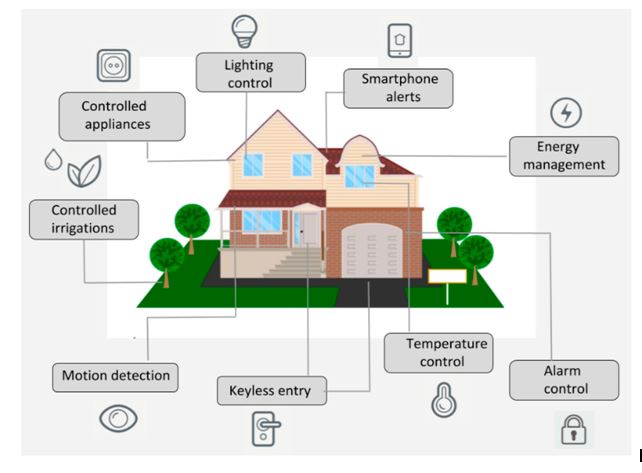
Smart Devices Around You: How Local Tech is Making Life Easier

Dial@R&D
01 July 2025 . 8 Minute Read
Introduction
Imagine walking into your home, and the lights turn on automatically. Your fan starts spinning when the room gets warm, and your TV recommends tonight’s drama based on your watching habits. Sounds futuristic? In Bangladesh, this future is already here — thanks to smart devices and smart home technology.
From Dhaka’s urban apartments to middle-class homes in Chattogram or Rajshahi, smart gadgets are becoming more affordable and accessible. Products like Wi-Fi-enabled bulbs, motion sensors, smart TVs, and voice-controlled assistants are now sold in Bangladeshi online stores like Daraz, Pickaboo, and even in local markets.
This blog post introduces the concept of smart homes and smart devices, explores their relevance in Bangladeshi households, and demonstrates how these innovations are transforming modern life in practical, cost-effective ways.
What Is a Smart Device?
A smart device is an electronic gadget that connects to the internet or a local wireless network and can be controlled from a smartphone, tablet, or computer. These devices are often programmed to act autonomously or follow commands given by users remotely.
For example, a smart bulb can be turned on or off using a mobile app even if you’re not at home. A smart TV connects to the internet and allows you to watch shows on YouTube or Netflix without needing a cable connection.
Smart devices use sensors, software, and communication technologies like Wi-Fi, Bluetooth, or Zigbee to function. They also "learn" your habits through data to enhance your experience — such as recommending what to watch or adjusting temperature settings automatically.
What Is a Smart Home?
A smart home is a residence that uses smart devices and technologies to manage and control various functions automatically or through remote control. These include controlling lighting, air conditioning, security cameras, appliances, and even curtains or water pumps.
Smart homes work through:
Sensors, which collect data (like motion, temperature, or light levels).
Controllers, such as smartphones or voice assistants (like Google Assistant).
Connectivity, like Wi-Fi or mobile networks, to link and coordinate all the devices.
In simple terms, smart homes make life more convenient by automating tasks, saving energy, and improving security, all at your fingertips.
Tools and Methods Used in Smart Homes
In Bangladesh, smart home technology is becoming popular not just in luxury apartments, but also in middle-class homes and student hostels. These smart tools help manage household devices more easily, save electricity, and even offer safety benefits. Let’s explore some common examples and how they work.
1. Smart Lighting Systems
Smart bulbs and lighting kits allow users to turn lights on and off, dim brightness, or change color using a mobile app. Many brands, such as Mi, TP-Link, and locally made options, offer budget-friendly smart bulbs. For example, someone can schedule their bedroom lights to turn off automatically at midnight, or have hallway lights that switch on when someone walks by — using motion sensors.
This not only saves electricity but also adds comfort and safety, especially for children or elderly family members.
2. Smart Televisions (Smart TVs)
A smart TV is a television that can connect to the internet and stream videos directly from platforms like YouTube, Netflix, or Bioscope. Instead of needing a satellite dish or USB, users can watch live news, dramas, or cricket matches through apps.
In many Bangladeshi households, smart TVs have replaced traditional cable TV setups, giving families access to more educational and entertainment options — including free learning videos for students.
3. Smart Plugs and Switches
Smart plugs are special electrical outlets that can be controlled using an app. By plugging your fan, rice cooker, or lamp into a smart plug, you can turn them on or off without touching a switch. Some plugs can also be set on a timer.
These devices are simple to install and are available in local markets for as low as BDT 1,000–1,500, making them affordable for students or small business owners.
4. Home Security Gadgets
Home security is a growing concern, and smart devices offer helpful solutions. Wi-Fi-enabled CCTV cameras can be placed at entry gates or living rooms. These cameras send live video feeds to your phone, and some even alert you if they detect movement at unusual hours.
In many small shops and homes in cities like Chattogram and Dhaka, smart cameras have become a budget-friendly way to ensure safety.
5. Voice Assistants and Control Systems
Smart speakers like Google Nest Mini or Amazon Echo allow users to control devices just by speaking. For instance, you can say “Turn off the bedroom light,” and it will follow the command if connected to smart devices.
While this technology is still relatively new to most Bangladeshi households, it is becoming popular in urban areas for convenience, especially among tech-savvy youth and professionals.
Applications in Bangladesh (Local Context)
Case Study 1: Smart Fan and Light in a Rajshahi Home
A university lecturer in Rajshahi installed smart plugs to control his living room fan and LED light using a mobile app. He schedules the fan to switch on at 9 PM and off at 6 AM — reducing electricity waste and ensuring better sleep. His total setup cost was under BDT 3,000.
This small change made his home energy-efficient and easier to manage.
Case Study 2: Smart Security for Small Businesses in Chattogram
A bakery owner in Chattogram uses a smart camera system to monitor his shop remotely. He receives notifications on his phone if there’s movement during closed hours. The footage is stored in the cloud.
This inexpensive solution (around BDT 6,000) gives him peace of mind without needing full-time security staff.
Case Study 3: Student Hostel in Dhaka Using Smart Lights
Students in a Dhanmondi hostel installed motion-activated hallway lights. The system saves electricity and reduces bills. Using locally available sensors and affordable smart bulbs, they created a smart environment on a student budget.
Positive Impacts of Smart Living in Bangladesh
Smart living is bringing real and meaningful changes to people’s daily lives in Bangladesh. Let’s understand the benefits in more detail, especially how they relate to our homes, studies, finances, and safety.
1. Better Energy Use and Lower Electricity Bills
One of the biggest advantages of smart homes is energy saving. Smart bulbs and fans can be set to turn off automatically when not needed, or adjust based on room temperature or motion. This helps reduce waste and lowers monthly electricity bills — which is very helpful for families on a budget or students living in hostels.
For example, a smart fan that turns off at 6 AM every morning ensures no extra power is used while the person is no longer in the room.
2. More Convenience in Daily Tasks
Smart devices allow people to control home appliances without physically being near them. This is especially useful for elderly people, individuals with disabilities, or busy students who want to manage tasks more efficiently. With just a few taps on a phone, you can turn on the rice cooker, switch off the lights, or even check if someone is at the door.
This kind of comfort helps people save time and reduce stress in their daily routines.
3. Enhanced Home and Business Security
Using smart cameras and sensors, people can now monitor their homes or small businesses from anywhere in the country. These systems can send real-time alerts if unusual activity is detected. For example, a small business owner in Narayanganj can check his shop camera feed from his home in the evening — directly from his phone.
This adds a layer of safety without hiring expensive security guards or installing complex systems.
4. Smart Devices Are Becoming More Affordable
Not long ago, smart home gadgets were seen as expensive items only for affluent households. But now, many Bangladeshi brands and online stores offer affordable smart plugs, lights, cameras, and switches that cost between BDT 800 and BDT 3,000. This means even middle-income families and university students can start using smart devices in simple ways.
Thanks to platforms like Daraz, Pickaboo, and local electronics markets, smart living is reaching more homes across the country.
5. Encouraging Digital Skills and Learning
Using smart home technologies also helps young people develop important digital skills. Setting up devices, learning to configure Wi-Fi connections, or using mobile apps to manage home appliances gives students practical experience with IoT (Internet of Things), networking, and app usage — all of which are important in ICT and technology careers.
Challenges and Risks of Smart Devices and Smart Living in Bangladesh
While smart devices bring convenience and efficiency, they also introduce new challenges that users — especially students and families — must be aware of. Understanding these risks helps us use smart technology safely, effectively, and responsibly.
1. Internet and Power Reliability Issues
Most smart devices in Bangladesh depend on Wi-Fi or mobile internet to function. However, in many rural areas and even some urban neighborhoods, internet speed is inconsistent. Frequent load shedding or power cuts can interrupt the performance of smart systems.
Example: If your smart camera relies on Wi-Fi and power, a sudden blackout could disconnect it and leave your home unmonitored. This makes continuous use difficult for people in areas with unreliable electricity.
2. Cybersecurity and Privacy Risks
Smart devices collect and share data — sometimes without the user fully understanding it. Without proper setup and protection, these devices can become targets for hacking, spying, or data theft.
Common issues include:
Not changing the default password on smart cameras or plugs.
Giving apps access to private photos or microphones without checking settings.
Example: A family installs a smart door camera but doesn't secure it with a password. If a hacker accesses the camera feed, it could lead to serious privacy violations.
3. Lack of Awareness and Digital Literacy
Many users buy smart devices without knowing how to install, manage, or maintain them properly. This leads to frustration, device damage, or underuse. Elderly people, in particular, may find it hard to understand app-based controls or settings.
Example: A user sets up a smart plug but forgets to enable the timer feature. The device ends up functioning like a regular plug — losing its smart benefits. This highlights the need for digital training and basic user guidance in local languages.
4. Cost Barrier for Lower-Income Families
While smart gadgets have become more affordable, they still represent a luxury for many families. A basic smart setup (bulb, plug, and camera) might cost over BDT 3,000–5,000, which is a significant expense for daily wage earners or rural families.
Example: A small shop owner may want to install a smart camera but cannot afford the setup or monthly internet charges needed to operate it. This creates a digital gap, where only certain income groups benefit from smart living tools.
5. Overdependence and Lifestyle Disruption
Relying too much on automation or digital control can cause people to lose basic habits or physical awareness. Students may avoid physical activity or manual effort if everything is remote-controlled.
Example: Using voice commands for every small task (lights, music, or temperature) may make users passive or lazy over time, especially among younger children. Overuse of screen time and smart entertainment apps can also affect mental health, concentration, and sleep patterns, particularly in students.
Conclusion
Smart devices are no longer just luxury products — they’re becoming tools for better living in Bangladeshi homes. Whether it’s controlling a fan with your phone or securing your shop with a smart camera, these innovations offer practical solutions to everyday problems.
Understanding the concepts, tools, and local relevance of smart living helps students and citizens make better decisions. For ICT Olympiad participants, this topic opens up opportunities to design, implement, and improve smart solutions suited to Bangladesh’s needs.
Smart homes are not just about gadgets — they’re about using technology smartly to live better.
Practice Tasks (For University Level Students)
Research Task:
Interview three households or small businesses in your area using smart devices. Ask:
What devices are used?
Why were they chosen?
What benefits or problems have they experienced? Summarize in a 700-word report.
Design Task:
Create a simple prototype or layout (sketch or app mockup) of a “Smart Dorm Room” for students. Include:
Light/fan automation
Energy usage tracking
Study reminder system
Discussion Task (600 words):
“Can smart home technology reduce electricity bills and improve daily life for middle-income families in Bangladesh?” Support your answer with local examples.
Data Analysis Task:
Conduct a survey of 30 students about their awareness and usage of smart devices. Use graphs to show:
Most-used devices
Budget range
Perceived benefits Write a short reflection on how smart devices can be better promoted in Bangladesh.
Recent blogs




